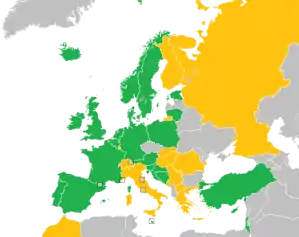Eurovision Song Contest 1999
The Eurovision Song Contest 1999 was the 44th edition of the annual Eurovision Song Contest. It took place in Jerusalem, following Dana International's win at the 1998 contest in Birmingham, United Kingdom with the song "Diva". This was Israel's third victory in the contest (after 1978 and 1979), and the second time hosting the event (after 1979).
| Eurovision Song Contest 1999 | |
|---|---|
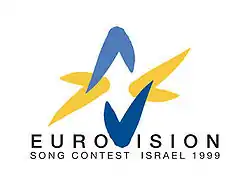 | |
| Dates | |
| Grand final | 29 May 1999 |
| Host | |
| Venue | Ussishkin Auditorium at the International Convention Center Jerusalem |
| Presenter(s) | |
| Directed by | Hagai Mautner |
| Executive supervisor | Christine Marchal-Ortiz |
| Executive producer | Amnon Barkai |
| Host broadcaster | Israel Broadcasting Authority (IBA) |
| Opening act | Digital animation "From Birmingham to Jerusalem" transitioning into a film about Jerusalem |
| Interval act | "Freedom Calling", with the song "Free" performed in a medley with a version of a traditional prayer for freedom, "Dror Yikra" by Dana International |
| Reprise act | All acts performed the English version of "Hallelujah" as a tribute to the victims of the Balkan War |
| Website | eurovision |
| Participants | |
| Number of entries | 23 |
| Debuting countries | None |
| Returning countries | |
| Non-returning countries | |
Participation map
| |
| Vote | |
| Voting system | Each country awarded 12, 10, 8–1 points to their 10 favourite songs |
| Nul points | None |
| Winning song | |
It was held on 29 May 1999 at the International Convention Center, the same venue that hosted it 20 years earlier. Television news anchor Yigal Ravid, singer and 1992 contestant Dafna Dekel and model/actress Sigal Shachmon were the show's hosts, and it was the first time that three presenters were used to host the Contest. Israel's two previous winners, Izhar Cohen, who won in 1978 with "A-Ba-Ni-Bi" and Milk and Honey's Gali Atari who won it the next year with "Hallelujah" attended as spectators.
After a tense voting,the winner of the Contest was Charlotte Nilsson, representing Sweden with "Take Me to Your Heaven", which scored 163 points. This was Sweden's fourth win in the Contest and the second in the 1990s (after Carola's win for Sweden in 1991).
Location
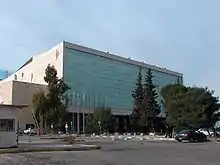
In the run-up to the Contest, many speculated that it would not be held in Israel, but would be moved to either Malta or stay at the United Kingdom (the countries that completed the top 3 of the 1998 Contest). This came about after major concerns over funding for the event from the Israeli government arose, alongside the opposition from Orthodox Jews that they would attempt to stop the Contest from coming to Israel after Dana International won the previous year's Contest. This, however, provided no hindrance for IBA or to the organizing team of the event, and the Ussishkin Auditorium at International Convention Center in Jerusalem was selected as the venue for the 44th Contest.[1]
Format
Long-standing rules in place for decades were abolished during this Contest: rules that each country had to sing in one of their national languages was abolished for the first time since 1977. A majority of the participating countries, fourteen out of twenty-three, chose to sing entirely or partly in English and only eight entirely in their respective national languages; Lithuania, Spain, Croatia, Poland, France, Cyprus, Portugal and Turkey, not counting the United Kingdom, Ireland and Malta, whose national language is English. Furthermore, live music became optional for the first time in the Contest's history. IBA took advantage of this and decided to drop the orchestra from the Contest as a way to conserve money for the show. This meant that for the first time all entries used backing track during their performances.[2] This caused controversy for Eurovision traditionalists, with two-time winner Johnny Logan criticising the move, describing the event now as "karaoke".[1]
A compilation CD was released in Israel by the host broadcaster and IMP Records. Due to licensing problems, the CD omitted the songs from Poland, Cyprus, The Netherlands and the United Kingdom.[3] Since then, all compilation CDs have featured all the songs.
It was announced in 1999 that, as of the 2000 Contest, the four biggest financial contributors to the European Broadcasting Union (EBU) – Germany, Spain, France and the United Kingdom – would all be given automatic entry into the Contest, regardless of their average scores over the past five years.[1][2]
Latvia had attempted to participate in the contest for the first time, but later withdrew. This gave Hungary a chance to enter the contest, however, Magyar Televízió decided not to take part, allowing Portugal to compete as the 23rd country.[2]
Draw for the order of performances took place on 17 November 1998.[4]
Austria, Bosnia and Herzegovina, Denmark and Iceland returned to the Contest after being relegated from competing in 1998. Lithuania also returned to the Contest for the first time in five years. The Lithuanian delegation has had budget problems to contend with, and so the EBU allowed the Lithuanians to arrive in Israel a day later than everyone else. The first delegation on the other hand, to arrive were Estonia.[2]
After being relegated from the 1998 Contest, Russia's Channel One had decided not to broadcast that year's contest, in order to allow for a strong comeback in Israel. However, as only countries which had broadcast the previous year's contest were allowed to enter the next year's contest, Russia was forced to miss another year. They were joined by Finland, Greece, Hungary, Macedonia, Romania, Slovakia and Switzerland; the countries with the lowest average scores over the previous five years.
The favourites to win the Contest came from Iceland's Selma with "All Out of Luck", and Cyprus's Marlain with "Tha 'Ne Erotas", after an internet poll by fans. But, while Iceland finished second to Sweden (the country's best showing in the contest), Cyprus failed to inspire televotes, finishing second last with only two points, both from the United Kingdom.[1][2]
Incidents
A number of controversies occurred before the Contest. Two songs selected to compete in Israel were found to be ineligible: Bosnia and Herzegovina's Hari Mata Hari were disqualified after their entry was discovered to have been released in Finland some years previously; Germany's Corinna May was also disqualified after her song was revealed to have been released in 1997 by a different singer.[1][5] Both artists would eventually represent their countries in Eurovision, in 2006 and 2002 respectively.
Croatia's entry, Marija Magdalena, attracted objections from the Norwegian delegation, due to synthesised male vocals being used on the backing track of Doris Dragović's entry. The EBU decided to reduce the country's score by a third for the purpose of calculating its five-year average to determine participation in future contests, though it was decided to leave its placement in the 1999 result unaffected.[1][2]
The interval act was provided by Dana International, who performed a cover of the Stevie Wonder song "Free", which although was a smash hit in Israel at the time, caused some controversy there due to the song's lyrics. Dana International also appeared at the end of the show, handing the winning trophy to Nilsson. After pretending that the trophy was too heavy to lift, she fell to the stage, bringing down the winning composers with her.[1][2] After the encore of the winning entry coming from Sweden, the three presenters re-appeared inviting everyone on stage to sing a rendition of the English version of "Hallelujah", the Israeli winner from the 1979 Contest, as a tribute to the victims of the Kosovo War (particularly then-Yugoslavia, which was banned from participation as penalty due this conflict), who were unable to view the contest after bombings destroyed television transmitters.[1]
Returning artists
Lead Artists
| Artist | Country | Previous Year(s) |
|---|---|---|
| Doris Dragović | 1986 (for | |
| Evelin Samuel | 1997 (as a backing singer for Maarja-Liis Ilus) | |
| Darja Švajger | 1995 |
Backing Performers[6]
| Artist | Country | Previous Year(s) |
|---|---|---|
| Chris and Moira | 1994 | |
| Gabriel Forss | 1997 (as a member of Blond) | |
| Stefán Hilmarsson | 1988 (as a member of Beathoven) and 1991 (with Eyjólfur Kristjánsson) | |
| Kenny Lübcke | 1992 (with Lotte Nilsson) | |
| Linda Williams | 1981 (for the |
Results
Voting structure
Each country had a televote, where the top ten most voted-for songs were awarded the 12, 10, 8, 7, 6, 5, 4, 3, 2, 1 points, with the exceptions of Turkey, Lithuania, Ireland and Bosnia and Herzegovina who used juries.
Score sheet
| Voting procedure used: 100% Televoting 100% Jury vote |
Voters | ||||||||||||||||||||||||
|---|---|---|---|---|---|---|---|---|---|---|---|---|---|---|---|---|---|---|---|---|---|---|---|---|---|
| Lithuania | 13 | 2 | 5 | 3 | 1 | 2 | |||||||||||||||||||
| Belgium | 38 | 4 | 2 | 10 | 2 | 10 | 5 | 5 | |||||||||||||||||
| Spain | 1 | 1 | |||||||||||||||||||||||
| Croatia | 118 | 6 | 5 | 12 | 12 | 8 | 7 | 1 | 7 | 4 | 2 | 1 | 6 | 6 | 8 | 7 | 5 | 10 | 8 | 3 | |||||
| United Kingdom | 38 | 5 | 4 | 5 | 2 | 4 | 1 | 4 | 4 | 8 | 1 | ||||||||||||||
| Slovenia | 50 | 10 | 2 | 2 | 12 | 1 | 6 | 12 | 5 | ||||||||||||||||
| Turkey | 21 | 4 | 5 | 12 | |||||||||||||||||||||
| Norway | 35 | 7 | 6 | 7 | 7 | 5 | 3 | ||||||||||||||||||
| Denmark | 71 | 5 | 5 | 5 | 1 | 12 | 8 | 8 | 3 | 7 | 5 | 2 | 4 | 6 | |||||||||||
| France | 14 | 2 | 2 | 8 | 2 | ||||||||||||||||||||
| Netherlands | 71 | 4 | 12 | 3 | 8 | 3 | 5 | 7 | 6 | 4 | 2 | 1 | 4 | 6 | 2 | 4 | |||||||||
| Poland | 17 | 7 | 4 | 6 | |||||||||||||||||||||
| Iceland | 146 | 8 | 8 | 10 | 10 | 10 | 10 | 12 | 7 | 4 | 12 | 12 | 4 | 4 | 2 | 10 | 10 | 3 | 10 | ||||||
| Cyprus | 2 | 2 | |||||||||||||||||||||||
| Sweden | 163 | 3 | 7 | 6 | 12 | 7 | 6 | 12 | 10 | 3 | 8 | 6 | 10 | 6 | 10 | 5 | 6 | 8 | 12 | 2 | 12 | 12 | |||
| Portugal | 12 | 12 | |||||||||||||||||||||||
| Ireland | 18 | 12 | 4 | 1 | 1 | ||||||||||||||||||||
| Austria | 65 | 6 | 7 | 4 | 6 | 3 | 2 | 3 | 8 | 1 | 7 | 5 | 5 | 8 | |||||||||||
| Israel | 93 | 3 | 8 | 8 | 1 | 3 | 2 | 2 | 10 | 4 | 10 | 1 | 10 | 3 | 8 | 1 | 6 | 7 | 2 | 4 | |||||
| Malta | 32 | 6 | 6 | 3 | 1 | 7 | 1 | 7 | 1 | ||||||||||||||||
| Germany | 140 | 10 | 7 | 3 | 1 | 6 | 12 | 3 | 5 | 8 | 12 | 12 | 5 | 2 | 12 | 10 | 12 | 3 | 10 | 7 | |||||
| Bosnia and Herzegovina | 86 | 1 | 10 | 10 | 7 | 7 | 8 | 6 | 3 | 5 | 3 | 6 | 12 | 8 | |||||||||||
| Estonia | 90 | 1 | 4 | 1 | 3 | 8 | 5 | 4 | 4 | 5 | 8 | 2 | 10 | 7 | 8 | 3 | 1 | 7 | 6 | 3 | |||||
12 points
Below is a summary of all 12 point in the final:
| N. | Contestant | Voting nation |
|---|---|---|
| 5 | ||
| 3 | ||
| 2 | ||
| 1 | ||
Qualification for the 2000 contest
In addition to the Big Four and the host country of the 2000 contest, Sweden, the 13 countries with the highest average scores between 1995 and 1999 were allowed to take part in the Eurovision Song Contest 2000.
Key:
Automatically qualified
Qualified
| Rank | Country | Average | Score | ||||
|---|---|---|---|---|---|---|---|
| 1995 | 1996 | 1997 | 1998 | 1999 | |||
| – | 116.80 | 76 | 77 | 227 | 166 | 38 | |
| 1 | 115.33 | 81 | 172 | 93 | |||
| – | 90.40 | 100 | 100 | 36 | 53 | 163 | |
| 2 | 89.00 | 44 | 162 | 157 | 64 | 18 | |
| 3 | 84.60 | 91 | 98 | 24 | 131 | 79[lower-alpha 1] | |
| 4 | 81.40 | 76 | 68 | 66 | 165 | 32 | |
| 5 | 76.00 | 78 | 5 | 150 | 71 | ||
| 6 | 75.50 | 94 | 82 | 36 | 90 | ||
| 7 | 75.20 | 148 | 114 | 0 | 79 | 35 | |
| 8 | 62.67 | 92 | 25 | 71 | |||
| – | 62.25 | 1 | 22 | 86 | 140 | ||
| 9 | 61.50 | 31 | 51 | 18 | 146 | ||
| 10 | 57.60 | 79 | 72 | 98 | 37 | 2 | |
| 11 | 53.00 | 67 | 68 | 12 | 65 | ||
| – | 50.80 | 119 | 17 | 96 | 21 | 1 | |
| 12 | 49.00 | 21 | 57 | 121 | 25 | 21 | |
| 13 | 47.50 | 8 | 22 | 122 | 38 | ||
| 14 | 45.40 | 84 | 16 | 60 | 17 | 50 | |
| – | 44.80 | 94 | 18 | 95 | 3 | 14 | |
| 15 | 33.75 | 14 | 13 | 22 | 86 | ||
| 16 | 29.00 | 5 | 92 | 0 | 36 | 12 | |
| 17 | 27.20 | 15 | 31 | 54 | 19 | 17 | |
| 18 | 13.00 | 13 | |||||
International broadcasts and voting
Voting and spokespersons
The spokespersons announced the score from their respective country's televote (or, in some cases, national jury) in running order.
.svg.png.webp) Lithuania – Andrius Tapinas
Lithuania – Andrius Tapinas.svg.png.webp) Belgium – Sabine De Vos[9]
Belgium – Sabine De Vos[9] Spain – Hugo de Campos
Spain – Hugo de Campos Croatia – Marko Rašica[10]
Croatia – Marko Rašica[10] United Kingdom – Colin Berry
United Kingdom – Colin Berry Slovenia – Mira Berginc
Slovenia – Mira Berginc Turkey – Osman Erkan
Turkey – Osman Erkan Norway – Ragnhild Sælthun Fjørtoft
Norway – Ragnhild Sælthun Fjørtoft Denmark – Kirsten Siggaard (Danish representative in 1984, 1985 and 1988 as member of Hot Eyes)[11]
Denmark – Kirsten Siggaard (Danish representative in 1984, 1985 and 1988 as member of Hot Eyes)[11] France – Marie Myriam (Winner of the 1977 contest)[12]
France – Marie Myriam (Winner of the 1977 contest)[12] Netherlands – Edsilia Rombley (Dutch representative in 1998 and 2007; host in 2020)
Netherlands – Edsilia Rombley (Dutch representative in 1998 and 2007; host in 2020) Poland – Jan Chojnacki
Poland – Jan Chojnacki Iceland – Áslaug Dóra Eyjólfsdóttir
Iceland – Áslaug Dóra Eyjólfsdóttir.svg.png.webp) Cyprus – Marina Maleni[13]
Cyprus – Marina Maleni[13] Sweden – Pontus Gårdinger[14]
Sweden – Pontus Gårdinger[14] Portugal – Manuel Luís Goucha[15]
Portugal – Manuel Luís Goucha[15] Ireland – Clare McNamara
Ireland – Clare McNamara Austria – Dodo Roščić
Austria – Dodo Roščić Israel – Yoav Ginai (Winner of the 1998 contest, as lyricist)[16]
Israel – Yoav Ginai (Winner of the 1998 contest, as lyricist)[16] Malta – Nirvana Azzopardi
Malta – Nirvana Azzopardi Germany – Renan Demirkan
Germany – Renan Demirkan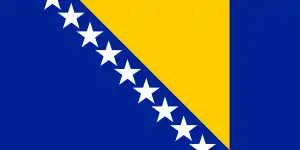 Bosnia and Herzegovina – Segmedina Srna
Bosnia and Herzegovina – Segmedina Srna Estonia – Mart Sander[17]
Estonia – Mart Sander[17]
Commentators
Most countries sent commentators to Jerusalem or commented from their own country, in order to add insight to the participants and, if necessary, the provision of voting information.
Participating countries
 Austria – Andi Knoll (ORF1)[18]
Austria – Andi Knoll (ORF1)[18].svg.png.webp) Belgium – Dutch: André Vermeulen and Bart Peeters (VRT TV1),[19] French: Jean-Pierre Hautier (RTBF La Une)[20]
Belgium – Dutch: André Vermeulen and Bart Peeters (VRT TV1),[19] French: Jean-Pierre Hautier (RTBF La Une)[20] Bosnia and Herzegovina – Ismeta Dervoz-Krvavac (BHT)
Bosnia and Herzegovina – Ismeta Dervoz-Krvavac (BHT) Croatia – Aleksandar "Aco" Kostadinov (HRT 1)[21]
Croatia – Aleksandar "Aco" Kostadinov (HRT 1)[21].svg.png.webp) Cyprus – Evi Papamichail (RIK 1)[13]
Cyprus – Evi Papamichail (RIK 1)[13] Denmark – Keld Heick (DR1)[11]
Denmark – Keld Heick (DR1)[11] Estonia – Marko Reikop (Eesti Televisioon)
Estonia – Marko Reikop (Eesti Televisioon) France – Julien Lepers (France 3)[20]
France – Julien Lepers (France 3)[20] Germany – Peter Urban (Das Erste)[22]
Germany – Peter Urban (Das Erste)[22] Iceland – Gísli Marteinn Baldursson (Sjónvarpið)[23]
Iceland – Gísli Marteinn Baldursson (Sjónvarpið)[23] Ireland – Pat Kenny (RTÉ One)[24]
Ireland – Pat Kenny (RTÉ One)[24] Israel – No commentator (IBA)
Israel – No commentator (IBA).svg.png.webp) Lithuania – TBC (LTV)
Lithuania – TBC (LTV) Malta – Charlo Bonnici (TVM)
Malta – Charlo Bonnici (TVM) Netherlands – Willem van Beusekom (TV2)[25]
Netherlands – Willem van Beusekom (TV2)[25] Norway – Jostein Pedersen (NRK1)[26]
Norway – Jostein Pedersen (NRK1)[26] Poland – Artur Orzech (TVP1)[27]
Poland – Artur Orzech (TVP1)[27] Portugal – Rui Unas (RTP1)[15]
Portugal – Rui Unas (RTP1)[15] Slovenia – Miša Molk (SLO1)
Slovenia – Miša Molk (SLO1) Spain – José Luis Uribarri (TVE1)[28]
Spain – José Luis Uribarri (TVE1)[28] Sweden – Pekka Heino and Anders Berglund (SVT2)[14]
Sweden – Pekka Heino and Anders Berglund (SVT2)[14] Turkey – Gülşah Banda (TRT 1)
Turkey – Gülşah Banda (TRT 1) United Kingdom – Terry Wogan (BBC One)[29]
United Kingdom – Terry Wogan (BBC One)[29]
Non-participating countries
.svg.png.webp) Australia – N/A (SBS TV)
Australia – N/A (SBS TV) Finland – Jani Juntunen (YLE TV1)[30]
Finland – Jani Juntunen (YLE TV1)[30] Greece – Dafni Bokota and Giorgos Ikonomou (ET1)[31]
Greece – Dafni Bokota and Giorgos Ikonomou (ET1)[31] Latvia – Unknown (LTV1)[32]
Latvia – Unknown (LTV1)[32] Macedonia – Ivan Mircevski (MTV 1)
Macedonia – Ivan Mircevski (MTV 1) Romania – Leonard Miron (TVR2)
Romania – Leonard Miron (TVR2) Russia – Yuri Aksyuta (Public Russian Television)
Russia – Yuri Aksyuta (Public Russian Television)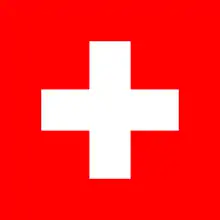 Switzerland – German: Sandra Studer (SF2), French: Jean-Marc Richard (TSR 1), Italian: Jonathan Tedesco (TSI 2)
Switzerland – German: Sandra Studer (SF2), French: Jean-Marc Richard (TSR 1), Italian: Jonathan Tedesco (TSI 2)
Radio commentators
The participating countries that provided radio broadcasts for the event are listed below.
.svg.png.webp) Belgium – Dutch: Guy De Pré (VRT Radio 2), French: Didier Mélon (RTBF La Première)
Belgium – Dutch: Guy De Pré (VRT Radio 2), French: Didier Mélon (RTBF La Première) Croatia – Draginja Balaš (HR 2)
Croatia – Draginja Balaš (HR 2) United Kingdom – Ken Bruce (BBC Radio 2)
United Kingdom – Ken Bruce (BBC Radio 2) Turkey – Fatih Orbay (TRT Radyo 3)
Turkey – Fatih Orbay (TRT Radyo 3) Norway – Jon Branæs (NRK P1)[33]
Norway – Jon Branæs (NRK P1)[33] Netherlands – Daniël Dekker and Hijlco Span (Radio 2)
Netherlands – Daniël Dekker and Hijlco Span (Radio 2).svg.png.webp) Cyprus – Pavlos Pavlou (CyBC Radio 2)
Cyprus – Pavlos Pavlou (CyBC Radio 2) Sweden – Carolina Norén (SR P3)[34]
Sweden – Carolina Norén (SR P3)[34] Ireland – Larry Gogan (RTÉ Radio 1)
Ireland – Larry Gogan (RTÉ Radio 1) Austria – Stermann & Grissemann (FM4)[35]
Austria – Stermann & Grissemann (FM4)[35] Israel – Daniel Pe'er (Reshet Gimel)
Israel – Daniel Pe'er (Reshet Gimel) Germany – Thomas Mohr (Deutschlandfunk/NDR 2)[36]
Germany – Thomas Mohr (Deutschlandfunk/NDR 2)[36]
Notes and references
Notes
- Croatia scored 118 points in the 1999 contest, however due to controversy surrounding its usage of pre-recorded vocals in the live performance, its score was reduced by a third for the purpose of calculating the five-year average to determine participation in future contests.
References
- O'Connor, John Kennedy (2007). The Eurovision Song Contest: The Official History. UK: Carlton Books. pp. 156–159. ISBN 978-1-84442-994-3.
- "History – Eurovision Song Contest 1999". European Broadcasting Union. Retrieved 2009-08-12.
- "Various - Eurovision Song Contest Israel 1999". Discogs. Retrieved 21 May 2020.
- http://www.eurosong.net/archive/esc1999.pdf
- "GERMAN NATIONAL FINAL 1999". 50webs.com.
- "1999". Diggiloo.net. Retrieved 7 December 2020.
- "Eurovision Song Contest 1999". The Diggiloo Thrush. Retrieved 5 March 2012.
- "Eurovision Song Contest 1999". 4Lyrics.eu. Retrieved 16 September 2020.
- mathiasehv (2009-09-30). "Eurovision 1999 Belgian Voting VRT by Sabine De Vos". YouTube. Retrieved 2012-08-09.
- "Pogledaj temu – SPOKESPERSONS". Forum.hrt.hr. 2008-02-29. Archived from the original on 2012-03-14. Retrieved 2012-08-09.
- "Forside". esconnet.dk. Archived from the original on 2012-03-24. Retrieved 2012-08-09.
- "Concours Eurovision de la Chanson • Consulter le sujet – Porte-paroles des jurys des pays francophones". Eurovision.vosforums.com. Retrieved 2012-08-09.
- Savvidis, Christos (OGAE Cyprus)
- "Infosajten.com". Infosajten.com. Archived from the original on July 18, 2012. Retrieved 2012-08-09.
- "Comentadores Do ESC – escportugalforum.pt.vu | o forum eurovisivo português". 21595.activeboard.com. Archived from the original on April 21, 2012. Retrieved 2012-08-09.
- "פורום אירוויזיון". Sf.tapuz.co.il. 1999-09-13. Archived from the original on October 8, 2011. Retrieved 2012-08-09.
- Archived August 22, 2011, at the Wayback Machine
- Archived February 20, 2005, at the Wayback Machine
- "Bart Peeters co-commentator op songfestival : showbizz". Mijnnieuws.skynetblogs.be. Archived from the original on 2012-04-02. Retrieved 2012-08-09.
- Christian Masson. "1999 – Jerusalem". Songcontest.free.fr. Retrieved 2012-08-09.
- "Pogledaj temu – POVIJEST EUROSONGA: 1956–1999 (samo tekstovi)". Forum.hrt.hr. 2009-05-15. Archived from the original on 2014-01-07. Retrieved 2012-08-09.
- "Dr. Peter Urban kommentiert – Düsseldorf 2011". Duesseldorf2011.de. Archived from the original on 2012-03-24. Retrieved 2012-08-09.
- "Morgunblaðið, 29 May 1999". Timarit.is. Retrieved 2012-08-09.
- betelgeuseIE (2010-02-08). "Eurovision Song Contest 1999 opening sequence". YouTube. Retrieved 2012-08-09.
- www.eurovisionartists.nl. "Welkom op de site van Eurovision Artists". Eurovisionartists.nl. Retrieved 2012-08-09.
- "Alt du trenger å vite om MGP – Melodi Grand Prix – Melodi Grand Prix – NRK". Nrk.no. 2003-05-27. Retrieved 2012-08-09.
- "Zobacz temat – Eurowizyjna gra". Eurowizja.Com.Pl. Archived from the original on 2012-03-23. Retrieved 2012-08-09.
- "FORO FESTIVAL DE EUROVISIÓN • Ver Tema – Uribarri comentarista Eurovision 2010". Eurosongcontest.phpbb3.es. Archived from the original on 2012-03-17. Retrieved 2012-08-09.
- "BBC One - Eurovision Song Contest, 1999, Grand Final: 1999". BBC.
- "Selostajat ja taustalaulajat läpi vuosien? • Viisukuppila". Viisukuppila.fi. Retrieved 2012-08-09.
- "Η Δάφνη Μπόκοτα και η EUROVISION (1987–2004)". Retromaniax.gr. Archived from the original on 2012-09-12. Retrieved 2012-08-09.
- "Diva.lv - Eirovīzijas Dziesmu konkursa Nacionālā atlase". www.diva.lv. Retrieved 26 May 2020.
- "NRK P1 1999.05.29 : programrapport". urn.nb.no 14 (29. mai 1999). Retrieved 2017-08-21.
- "Swedes stay at home with Eurovision fever". The Local. 2009-05-16. Archived from the original on 2013-05-15. Retrieved 2012-09-29.
- "Song Contest mit Stermann & Grissemann". wien ORF.at. 2012-05-01. Retrieved 2012-09-29.
- "Thomas Mohr: Mit Dschinghis Khan im Garten". Eurovision.de. 2011-05-14. Retrieved 2012-10-28.
External links
| Wikimedia Commons has media related to Eurovision Song Contest 1999. |
